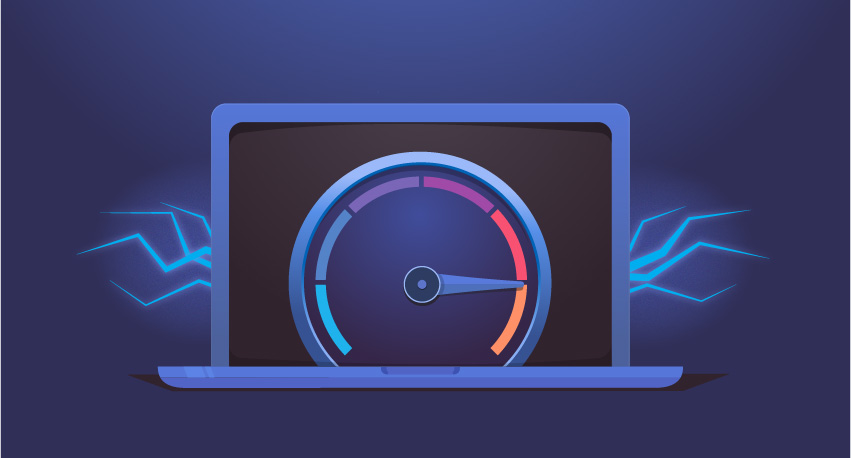The Best Internet for Gaming in 2026
Get an edge with fast speed and low latency
Jan 5, 2026 | Share
Gaming, Internet Speed Guides
-
Best overallPrices: $49.99–$109/mo. w/ Auto Pay
- Pro: Lowest latency
- Con: Equipment fees
- Avg. latency: 13.28 ms
- Max advertised speed: 2,300Mbps
-
Best for availabilityPrices: $30–$70/mo.
- Pro: Wide availability
- Con: Price hikes
- Avg. latency: 33.40 ms
- Max advertised speed: Up to 1,000Mbps (wireless speeds may vary)
-
Best for cable speedPrices: $40–$100/mo. for 12 mos.
- Pro: Gig+ cable internet
- Con: Price hikes
- Avg. latency: 23.45 ms
- Max advertised speed: 2,000Mbps
-
Best for pricePrices: $45–$155/mo.
- Pro: Affordable fiber
- Con: DSL data caps
- Avg. latency: 24.67 ms
- Max advertised speed: 5,000Mbps
-
Best for fiber speedPrices: $70–$150/mo.
- Pro: Great fiber speeds
- Con: Limited availability
- Avg. latency: 25.03 ms
- Max advertised speed: 8,000Mbps
-
Best for budgetsPrices: $35–$115/mo.
- Pro: No contracts
- Con: Price hikes
- Avg. latency: 35.66 ms
- Max advertised speed: 2,000Mbps
Data effective 01/05/2026. Data taken from internet user results conducted on HighSpeedInternet.com’s speed test between October 1, 2020, to October 1, 2021. Not all speeds and packages available in all areas and are subject to change.
Our pick: Which internet service is best for gaming?
The best internet service provider for gaming is Verizon Fios. It uses fiber all the way to your front door to deliver connections with the lowest average latency, according to our tests. It also has the second-best average upload and download speeds.
If you don’t have access to fiber, your next best option is cable internet through Spectrum or Xfinity. Spectrum has the widest availability and no modem fees, while Xfinity offers one of the fastest cable speeds in the nation.
Is Verizon Fios available where you live?
Enter your zip code below to see if Verizon’s game-changing fiber is in your area.
In this roundup:
Best internet for gaming | Provider comparisons at a glance | What to look for | Best overall | Specs and features | FAQ
In this roundup:
- Best internet for gaming
- Provider comparisons at a glance
- What to look for
- Best overall
- Specs and features
- FAQ
Compare top internet provider speeds and prices
| Price | Max advertised speed | Average latency | |
|---|---|---|---|
Best overall | $49.99–$109/mo.* w/ Auto Pay | 2,300Mbps | 13.28 ms |
Price | $45–$155/mo.§ | 5,000Mbps | 24.67 ms |
Availability | $30–$70/mo.† for 12 mos. | Up to 1,000Mbps (wireless speeds may vary) | 33.40 ms |
Fiber speed | $70–$150/mo.|| | 8,000Mbps | 25.03 ms |
Cable speed | $40–$100/mo.‡ for 12 mos. | 2,000Mbps | 23.45 ms |
Data as of 01/05/2026. Offers and availability may vary by location and are subject to change.
* See Verizon disclaimers.
† See Spectrum disclaimers.
‡ See Xfinity disclaimers.
§ See AT&T disclaimers.
|| See Google Fiber disclaimers.
Compare more speeds and latencies
- Best for customer service: Cox
- Best for rural gamers: Optimum
- Best for the Midwest: MetroNet
- Best for cable latency: Astound
- Best for budgets: Sparklight
How Much Internet Speed Do You Need?
Est. Time: 60 seconds
Answer 6 questions and get a personalized internet speed recommendation!
How many people in your household use the internet/WiFi on a daily basis?
How many devices in your home connect to the internet, including tablets, gaming consoles, and smart devices?
How many people in your household work from home?
What video quality do you use for streaming TV and movies?
How intensely does your household participate in online gaming?
Does your household download large files from the cloud or via the internet?
What should you look for in the best internet for gaming?
You need an internet service that doesn’t add to your overall latency. The connection to your internet provider’s network should be quick, so the only real latency issues are between your provider and the remote server.
That said, you should shop for a fiber internet service first. Fiber transmits data more efficiently than cable or DSL. Plus, fiber supports symmetrical speeds, which is essential for livestreamers who broadcast gameplay to Twitch and Facebook Gaming.
Upload speeds should take priority over download speeds too. You don’t want your gameplay input dragging along at a snail’s pace as it travels to the gaming server.
How much speed do you really need for gaming?
Believe it or not, you don’t need superfast download speeds to play games online. We show you exactly what you need for gaming networks, game streaming services, and livestreaming in our guide to internet speeds for gaming.
Best overall—Verizon Fios
Verizon Fios has the best average latency, which is exactly what you want. Verizon’s internal network won’t bottleneck your connection, unlike others on our list. The only other provider that comes close to Verizon Fios is Ziply Fiber.
Verizon offers four fiber plans in all, and all of them have symmetrical speeds. You can get the Internet 300/300 plan and have identical upload and download speeds of up to 300Mbps, so there’s no real worry about latency due to upload speeds. Cable internet can’t promise the same peace of mind.
The drawback is Verizon Fios doesn’t go beyond 2,300Mbps, unlike AT&T. On the flip side, Verizon has a larger fiber footprint than AT&T: 65% of its service area has fiber, whereas AT&T’s fiber covers 31% of its service areas. Plus, Verizon received excellent customer feedback for speed and reliability in our latest customer satisfaction survey.
If you want fiber for internet gaming or livestreaming, Verizon Fios is an excellent choice.
Compare Verizon Fios plans and pricing
| Package | Price | Max download | Max upload |
|---|---|---|---|
| Fios 300 Mbps | $49.99/mo. w/ Auto Pay | Up to 300Mbps | Up to 300Mbps |
| Fios 500 Mbps | $74.99/mo. w/ Auto Pay | Up to 500Mbps | Up to 500Mbps |
| Fios 1 Gig | $89.99/mo. w/ Auto Pay | Up to 940Mbps | Up to 880Mbps |
| Fios 2 Gig | $109.00/mo. w/ Auto Pay | Up to 2,300Mbps | Up to 2,300Mbps |
Data as of 8/06/24. Offers and availability may vary by location and are subject to change.
Best availability—Spectrum
Spectrum has the widest availability of all the internet providers on our list, covering 38.3% of the US. It delivers mostly cable internet and some fiber.
The big selling point for Spectrum is that it doesn’t have a data cap. Its main competitor, Xfinity, limits your data allowance to 1.2TB per month and charges an additional $30 a month for unlimited data. Spectrum doesn’t do that, which is vital since game files and updates shoot up into gigabytes.
Spectrum also doesn’t have a monthly modem or gateway rental fee, but you do pay a monthly WiFi access fee unless you install a store-bought gaming router. In that case, have Spectrum disable WiFi in the gateway or return Spectrum’s standalone router to remove the monthly fee.
Overall. Spectrum’s cable internet service is your best bet for competitive gaming online if fiber isn’t available in your area. You can’t go wrong with the Spectrum Internet Premier and Spectrum Internet Gig plans.
Compare Spectrum plans and pricing
| Package | Price | Max download | Max upload |
|---|---|---|---|
| Spectrum Internet Advantage | $30/mo.* for 12 mos. | Up to 100Mbps (wireless speeds may vary) | Up to 10Mbps (wireless speeds may vary) |
| Spectrum Internet Premier w/ Spectrum Advanced | $60/mo.† for 12 mos. | Up to 500Mbps (wireless speeds may vary) | Up to 20Mbps (wireless speeds may vary) |
| Spectrum Internet Gig | $70/mo.† for 12 mos. | Up to 1,000Mbps (wireless speeds may vary) | Up to 35Mbps (wireless speeds may vary) |
Data as of 05/08/24. Offers and availability may vary by location and are subject to change.
* Offer based on eligibility requirements. Standard rates apply after promo period. Additional charge for installation. Speeds based on wired connection. Actual speeds (including wireless) vary and are not guaranteed. Services subject to all applicable service terms and conditions, subject to change. Not available in all areas. Restrictions apply.
† Limited time offer; subject to change; new residential customers only (no Spectrum services within past 30 days) and in good standing with Spectrum. Taxes and fees extra in select states. SPECTRUM INTERNET: Standard rates apply after promo period. Additional charge for installation. Speeds based on wired connection. Actual speeds (including wireless) vary and are not guaranteed. Gig capable modem required for Gig speed. For a list of Gig capable modems, visit spectrum.net/modem. Services subject to all applicable service terms and conditions, subject to change. Not available in all areas. Restrictions apply.
Best for cable speed—Xfinity
Xfinity is the third-largest internet provider, covering 34.2% of the US. That gives it the upper hand over Astound, another cable internet provider with better latency but a smaller footprint. Spectrum is Xfinity’s biggest competitor and has a slightly higher latency.
Xfinity’s cable internet reaches up to 2,000Mbps in download speed and up to 300Mbps in upload speed. Xfinity also offers a residential fiber plan based on its metro business fiber service, but it’s so scarce we don’t even list it. Plus, it’s expensive and comes with high installation fees. We don’t recommend this plan even though we prefer fiber over cable. However, it seems customers get along just fine with Xfinity’s cable connections, as Xfinity earned the average speed satisfaction ratings two years in a row in our annual customer satisfaction survey.
You’ll get unlimited data with any Xfinity plan, plus equipment included at no extra cost. You won’t have to worry about any pesky equipment rental fees or tracking data usage, so this gives Xfinity major points in comparison to other cable providers.
Compare Xfinity plans and pricing
| Package | Price | Max download | Max upload |
|---|---|---|---|
| 300 Mbps | $40/mo.* for 12 mos. | 300Mbps | Up to 100Mbps |
| 500 Mbps | $55/mo.* for 12 mos. | 500Mbps | Up to 100Mbps |
| 1 Gig | $70/mo.* for 12 mos. | 1,000Mbps | Up to 100Mbps |
| 1.2 Gig | $100/mo.* for 12 mos. | 1,200Mbps | Up to 100Mbps |
| 2 Gig | $100/mo.* for 12 mos. | 2,000Mbps | Up to 250Mbps |
Data as of 09/19/2025. Offers and availability may vary by location and are subject to change.
* For 12 months, no term contract. Restrictions apply. Autopay w/ stored bank account and paperless billing req’d. Taxes and fees extra and subj. to change. Reduced speeds after 30 GB of usage/line. Data thresholds may vary.
Best for price—AT&T
$45–$155/mo.
Specs:
- Connection type: Fiber, 5G fixed wireless
- Max advertised speed: 5,000Mbps
- Average latency: 24.67 ms
- Data cap: No
- States covered: 21
AT&T is now one of the fastest big-name internet providers in the US with its 5Gbps plan, which, honestly, is a little overkill for home internet. A single 8K video stream will probably require at least 50Mbps, so even a gigabit plan should handle the load easily.
As a gamer, you want AT&T’s fiber internet over its DSL service. Sure, you can game online with DSL, but you get better speeds if you go with fiber—which translates to better latency. Surprisingly, AT&T has a lower latency average than Google Fiber, but it’s far higher than Verizon Fios (fiber), Astound (cable), and Xfinity (cable).
AT&T is one of the best high speed internet providers in terms of price. It ranks second for price satisfaction in our latest customer satisfaction survey, behind only T-Mobile. For example, you can get AT&T’s 500Mbps fiber plan for $65 per month, which is slightly cheaper than Spectrum’s 500Mbps cable plan. After 12 months, AT&T becomes a far better deal, costing you $30 less than Spectrum—plus you get symmetrical speeds with AT&T.
AT&T is the second-largest internet provider on our list, serving 36.5% of the US. Its fiber plans don’t have data caps, but its DSL and fixed wireless internet services do.
Overall, you should choose a fiber plan from AT&T if it’s in your area—even if Verizon Fios offers a similar service.
Compare AT&T plans and pricing
| Package | Price | Max download | Max upload |
|---|---|---|---|
| Internet 100 | $45/mo.† | 100Mbps | 100Mbps |
| Internet 300 | $55/mo.* | 300Mbps | 300Mbps |
| Internet 500 | $65/mo.* | 500Mbps | 500Mbps |
| Internet 1 GIG | $80/mo.† | 1,000Mbps | 880Mbps |
| Internet 2 GIG | $125/mo.† | 2,000Mbps | 2,000Mbps |
| Internet 5 GIG | $155/mo.† | 5,000Mbps | 5,000Mbps |
| Internet Air | $60/mo.‡ | Up to 225Mbps | 30Mbps |
Data as of 01/05/2026. Offers and availability may vary by location and are subject to change.
* Price after $5/mo Autopay & Paperless bill discount (w/in 2 bills). Plus taxes & fees. Monthly State Cost Recovery Charge in TX, OH, NV applies. One time install charge may apply. Ltd. avail/areas. Call or go to www.fiber.att.com to see if you qualify. Speeds based on wired connection. Actual speeds may vary. For more info, go to www.att.com/speed101.
† Above pricing is after $10/mo Autopay & Paperless bill discount with a debit card or bank account; if using a credit card, then price is $5/mo more. Pricing includes Equipment Fee. Up to $99 install fee may apply, plus tax where applicable.
‡ $60/mo after $5 discount when enrolled in Autopay. Paperless billing req’d. Not available in NY. Monthly State Cost Recovery Charge in TX, OH, NV applies. . Service subj. to Internet Terms of Service at att.com/internet-terms. Offers may be modified, or discontinued, at any time without notice. Other conditions may apply to all offers. Speeds based on wired connection. Actual speeds may vary. For more info, go to www.att.com/speed101.
Best for fiber speed—Google Fiber
Google Fiber offers residential fiber internet speeds up to 8,000Mbps, but it’s extremely limited in availability, covering just 1.3% of the US. Right now, you can get it in 11 locations, including Atlanta, Nashville, Salt Lake City, and Kansas City.
Google Fiber’s biggest competitor is AT&T in terms of speed. Both offer similar 1Gbps and 2Gbps plans, but AT&T has a larger fiber footprint. Of the two, Google Fiber is $10 cheaper each month than AT&T.
Surprisingly, Google Fiber’s average latency is more than doubled that of Verizon Fios at 27.4 ms, but you’ll see faster speeds with Google. Both Google Fiber plans lock the maximum upload speeds to 1,000Mbps, while Verizon’s maximum is 880Mbps.
We strongly recommend Google Fiber if it’s available in your area.
Compare Google Fiber plans and pricing
| Package | Price | Max download | Max upload |
|---|---|---|---|
| Core 1 Gig | $70/mo. | 1,000Mbps | 1,000Mbps |
| Home 3 Gig | $100/mo. | 3,000Mbps | 3,000Mbps |
| Edge 8 Gig | $150mo. | 8,000Mbps | 8,000Mbps |
| 1 Gig | $70/mo.* | 1,000Mbps | 1,000Mbps |
| 2 Gig | $100/mo.* | 2,000Mbps | 2,000Mbps |
| 5 Gig | $125.00/mo.** | 5,000Mbps | 5,000Mbps |
| 8 Gig | $150.00/mo.** | 8,000Mbps | 8,000Mbps |
Data as of 12/18/2025. Offers and availability may vary by location and are subject to change.
* Plus taxes and fees. Upload/download speed and device streaming claims are based on maximum wired speeds. Actual Internet speeds are not guaranteed and may vary based on factors such as hardware and software limitations, latency, packet loss, etc.
**Available in select markets only. Plus taxes and fees. Upload/download speed and device streaming claims are based on maximum wired speeds. Actual Internet speeds are not guaranteed and may vary based on factors such as hardware and software limitations, latency, packet loss, etc.
Also recommended for gaming online
In addition to those listed above, many internet providers across the US can give you a great online gaming experience. Here’s a list with a few more recommendations and their data pulled from our proprietary testing:
| Type | Avg. latency | Max advertised speed | |
|---|---|---|---|
Cable latency | Cable, fiber | 18.92 ms | 1,500Mbps |
Midwest region | Fiber | 25.40 ms | 5,000Mbps |
Customer ervice | Cable | 24.76 ms | 2,000Mbps |
Rural gamers | Cable, fiber | 18.63 ms | 8,000Mbps |
Budgets | Cable | 35.66 ms | 6,000Mbps |
Data as of 12/18/25. Offers and availability may vary by location and are subject to change.
What makes an internet connection good for gaming online?
A good internet connection adds as little latency between you and the remote gaming server as possible. It provides decent upload speeds to keep latency low and reliable connectivity to prevent other players from suddenly appearing in your face. Your monthly data allowance also plays an important role in downloading digital games and their associated multi-gig updates.
Connection type
Fiber is the best internet connection for gaming. It sends light pulses along glass fibers versus piggybacking your data on radio waves like cable and DSL. Fiber’s light pulses are interpreted like Morse code, so there’s no modem involved unless the fiber service stops at a utility pole and coax or telephone lines take over.
That said, fiber can have faster downloads that cable and DSL, depending on the plan. Plus it supports symmetrical speeds that match your upload speeds to your downloads. Cable and DSL internet do not support symmetrical speeds, so we’ll always suggest fiber to gamers who livestream to Twitch and similar services.
Cable internet is a good runner-up platform. DSL isn’t ideal unless you’re on a budget or it’s the only internet connection in your area. Avoid satellite internet altogether because the trip into space and back adds a ton of latency due to distance.
Latency
Latency (or ping rate) is the amount of time a bit of data uses to make a trip to the remote gaming server and back. High latency results in delayed responses on the screen, teleporting players, and players using you as target practice while they laugh in your ear.
Every internet connection has some latency because it takes time for your data to travel back and forth. But if there’s unnecessary latency within your provider’s network, your communication with the server will be longer than usual.
Technically, latency lower than 100 ms is decent. However, our data shows the average latency between the user and the provider. Get an internet provider with the lowest latency possible if you can.
Upload speed
Make sure your upload speed can handle online games without causing latency. Your gaming data—including your input, position, viewpoint, and so on—needs fast transport to the gaming server or network. The latest consoles need up to 3Mbps in upload speed, but your other devices also use that upload bandwidth to quietly send data to remote servers.
Get a plan with 6Mbps of upload speed or more so that everyone in the home has enough bandwidth without interrupting the resident gamer(s).
Download speed
You don’t need a lot of download speed to play games online. The Xbox One X/S, Xbox Series X/S, and Nintendo Switch consoles each require a minimum of 3Mbps, while the PlayStation 4 and 5 need only 2Mbps. Even if you wanted to stream 4K video from Apple TV while you play online, your combined download bandwidth would need to be only 27Mbps.
In gaming, you need download speed primarily for updates and full digital game installs from Steam, Microsoft Store, PlayStation Store, and so on. The more bits you can obtain in a second, the faster you can jump into the game.
For example, if your game download size is 30GB, you can download it in 10 minutes using a 400Mbps connection or 40 minutes using a 100Mbps connection.
Of course, download speed is also vital if you have multiple gamers in the home playing online, installing new games, or downloading comically large updates. You can each play games online comfortably using a 100Mbps connection, but latency becomes your biggest adversary when other non-gaming services intrude on your bandwidth.
Get an internet connection with download speeds of at least 100Mbps.
Data allowance
Choose a service that doesn’t have a data cap and doesn’t charge an added fee for unlimited data.
Even physical copies of a game require digital updates, and those can be pretty hefty. Not only do you receive data even if you’re just playing online, but you also send data. All that data can add up and chip away at your monthly allowance.
Our verdict
Verizon Fios is the best internet service to play games online. It has the best latency in our tests and the second-best average upload and download speeds next to Google Fiber. AT&T is the best fiber alternative if Verizon Fios isn’t in your area, offering a wide range of speeds at an affordable price.
If you don’t have access to fiber, Spectrum has the widest availability in the US. Spectrum doesn’t have data caps, modem fees, or extra fees for unlimited data. However, Xfinity has Spectrum beat with the fastest cable internet plan, reaching 2,000Mbps. Xfinity also has better upload and download speed averages in our tests.
But let’s get real here folks: any internet service other than satellite is suitable for gaming online. Fiber is ideal for livestreaming, while cable has wide availability. You can even get by with DSL if others in the home aren’t eating up all your bandwidth. Just choose a plan that’s ideal for your whole household, and you should be good to go.
How HSI ranked the best internet for gaming in the US
We provide an internet speed test used by millions of people across the US. The results are collected by our speed test for each internet provider and are averaged together every three months. We use this data to generate an integrated speed score (ISS) to compare internet providers in terms of speed—our list of the fastest internet providers is a good example.
In this case, we compared internet providers based on latency because you don’t need a lot of upload and download speed to play games online. Internet providers typically advertise their maximum speeds only, so gamers won’t know if they can get better latency with a different provider unless they switch.
By pulling the latency averages from our proprietary data, we can compare internet providers and suggest the best internet connections for gamers.
FAQ about internet for gaming
What is a good upload speed for gaming?
What is a good download speed for gaming?
Why are the required download speeds larger than uploads?
Why is fiber the best internet for gaming?
Author - Kevin Parrish
Kevin Parrish has more than a decade of experience working as a writer, editor, and product tester. He began writing about computer hardware and soon branched out to other devices and services such as networking equipment, phones and tablets, game consoles, and other internet-connected devices. His work has appeared in Tom’s Hardware, Tom's Guide, Maximum PC, Digital Trends, Android Authority, How-To Geek, Lifewire, and others. At HighSpeedInternet.com, he focuses on network equipment testing and review.
Editor - Cara Haynes
Cara Haynes has been editing and writing in the digital space for seven years, and she's edited all things internet for HighSpeedInternet.com for five years. She graduated with a BA in English and a minor in editing from Brigham Young University. When she's not editing, she makes tech accessible through her freelance writing for brands like Pluralsight. She believes no one should feel lost in internet land and that a good internet connection significantly extends your life span.




